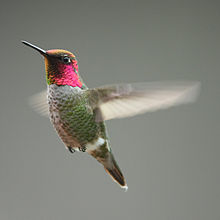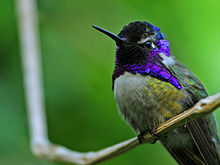Classification
Domain: Eukarya
Kingdom: Animalia
Phylum: Chordata
Subphylum: Vertebrata
Class: Aves
Order: Apodiformes
Family: Trochilidae
Genus:
Calypte
Species: Calypte anna
Calypte anna
belong to the domain eukarya because
they exhibit traits such as a nucleus and membrane bound
organelles. They belong to the animalia kingdom because
they are multicellular, heterotrophs, and lack a rigid cell wall
that plants posses (Animal Diversity Web).
Anna's hummingbird are classified under the phylum chordata
because they posses most notable a notochord but also have
bilateral symmetry, three distinct tissue types, a single dorsal
hollow nerve cord, as well as many other traits shared by the
phylum chordata (Animal Diversity Web).
They fall under the subphylumm vertebrata because of the chain
of vertebrae that lie on the dorsal portion of the animal.
Anna's hummingbird belongs to the Aves class because of the
trait of having feathers, a fast metabolism, hard-shelled eggs,
as well as the ability to fly (Animal Diversity Web).
Calypte anna belongs to the order apodiformes, which means
hummingbirds and swifts. Apodiforms share the synapomorphy
of being "unfooted" (Animal Diversity Web).
They then belong to the family trochilidae which have
common traits such as feeding on nectar (and occasionally
insects), narrow elongated beaks, and hovering flight (Animal
Diversity Web).
Anna's hummingbird is one of two species in the genus
Calypte. Calypte means capped which is fitting to
these two organisms because both species exhibit a solid,
brightly colored feather pattern covering their entire head,
giving them a "capped" apperance (Animal Diversity Web).
The closest relative to Calypte anna is the species
Calypte costae. These two species are very similar to
each other except in the coloration of the head of the male.
Calypte anna males exhibit a bright iridescent red head
while Calypte costae males exhibit a bright iridescent
purple head.
Return to Home Page
Go to Habitat!
Page created by Kristine Kumferman

